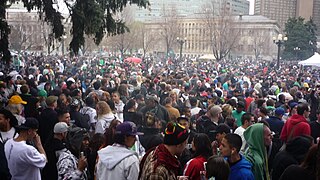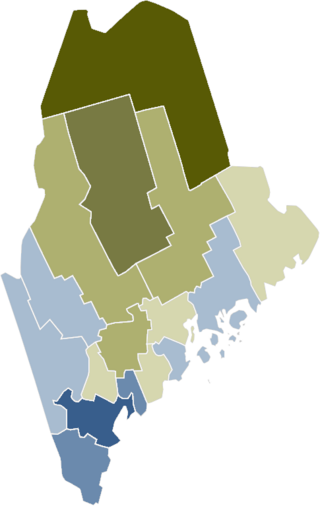
Cannabis in Oregon is legal for both medical and recreational use. In recent decades, the U.S. state of Oregon has had a number of legislative, legal, and cultural events surrounding use of cannabis. Oregon was the first state to decriminalize the possession of small amounts of cannabis, and among the first to authorize its use for medical purposes. An attempt to recriminalize possession of small amounts of cannabis was turned down by Oregon voters in 1997.

Cannabis in California has been legal for medical use since 1996, and for recreational use since late 2016. The state of California has been at the forefront of efforts to liberalize cannabis laws in the United States, beginning in 1972 with the nation's first ballot initiative attempting to legalize cannabis. Although it was unsuccessful, California would later become the first state to legalize medical cannabis through the Compassionate Use Act of 1996, which passed with 56% voter approval. In November 2016, California voters approved the Adult Use of Marijuana Act with 57% of the vote, which legalized the recreational use of cannabis.

In Colorado, cannabis has been legal for medical use since 2000 and for recreational use since late 2012. On November 7, 2000, 54% of Colorado voters approved Amendment 20, which amended the State Constitution to allow the use of marijuana in the state for approved patients with written medical consent. Under this law, patients may possess up to 2 ounces (57 g) of medical marijuana and may cultivate no more than six marijuana plants. Patients who were caught with more than this in their possession could argue "affirmative defense of medical necessity" but were not protected under state law with the rights of those who stayed within the guidelines set forth by the state. The Colorado Amendment 64, which was passed by voters on November 6, 2012, led to recreational legalization in December 2012 and state-licensed retail sales in January 2014. The policy has led to cannabis tourism. There are two sets of policies in Colorado relating to cannabis use: those for medicinal cannabis and for recreational drug use along with a third set of rules governing hemp.

In the United States, cannabis is legal in 38 of 50 states for medical use and 24 states for recreational use. At the federal level, cannabis is classified as a Schedule I drug under the Controlled Substances Act, determined to have a high potential for abuse and no accepted medical use, prohibiting its use for any purpose. Despite this prohibition, federal law is generally not enforced against the possession, cultivation, or intrastate distribution of cannabis in states where such activity has been legalized. On May 1, 2024, the Associated Press reported on federal plans to change marijuana to a Schedule III drug.

The legal history of cannabis in the United States began with state-level prohibition in the early 20th century, with the first major federal limitations occurring in 1937. Starting with Oregon in 1973, individual states began to liberalize cannabis laws through decriminalization. In 1996, California became the first state to legalize medical cannabis, sparking a trend that spread to a majority of states by 2016. In 2012, Washington and Colorado became the first states to legalize cannabis for recreational use.

Cannabis in Massachusetts is legal for medical and recreational use. It also relates to the legal and cultural events surrounding the use of cannabis. A century after becoming the first U.S. state to criminalize recreational cannabis, Massachusetts voters elected to legalize it in 2016.

In the U.S. state of Maine, marijuana (cannabis) is legal for recreational use. It was originally prohibited in 1913. Possession of small amounts of the drug was decriminalized in 1976 under state legislation passed the previous year. The state's first medical cannabis law was passed in 1999, allowing patients to grow their own plants. The cities of Portland and South Portland decriminalized the possession and recreational use of marijuana in 2013 and 2014, respectively.
Cannabis in Arkansas is illegal for recreational use. First-time possession of up to four ounces (110 g) is punished with a fine of up to $2,500, imprisonment of up to a year, and a mandatory six month driver's license suspension. Medical use was legalized in 2016 by way of a ballot measure to amend the state constitution.
Cannabis in North Dakota is legal for medical use but illegal for recreational use. Since 2019 however, possession under a 1/2 ounce has been decriminalized in the sense that there is no threat of jail time, though a criminal infraction fine up to $1,000 still applies. The cultivation of hemp is currently legal in North Dakota. In November 2018, the state's voters voted on recreational marijuana legalization, along with Michigan; the measure was rejected 59% to 41%. Two groups attempted to put marijuana legalization measures on the June 2020 Primary and the November 2020 elections, but were prevented from doing so by the COVID-19 pandemic.
Cannabis in Oklahoma is illegal for recreational use, but legal for medical use with a state-issued license, while CBD oil derived from industrial hemp is legal without a license.

Cannabis in Arizona is legal for recreational use. A 2020 initiative to legalize recreational use passed with 60% of the vote. Possession and cultivation of recreational cannabis became legal on November 30, 2020, with the first state-licensed sales occurring on January 22, 2021.

Cannabis in Missouri is legal for recreational use. A ballot initiative to legalize recreational use, Amendment 3, passed by a 53–47 margin on November 8, 2022. Possession for adults 21 and over became legal on December 8, 2022, with the first licensed sales occurring on February 3, 2023.
Cannabis in New Mexico is legal for recreational use as of June 29, 2021. A bill to legalize recreational use – House Bill 2, the Cannabis Regulation Act – was signed by Governor Michelle Lujan Grisham on April 12, 2021. The first licensed sales of recreational cannabis began on April 1, 2022.

Cannabis in New Jersey is legal for both medical use and recreational use. An amendment to the state constitution legalizing cannabis became effective on January 1, 2021, and enabling legislation and related bills were signed into law by governor Phil Murphy on February 22, 2021.

Cannabis in Maryland is legal for medical use and recreational use. Possession of up to 1.5 ounces and cultivation of up to 2 plants is legal for adults 21 years of age and older. In 2013, a state law was enacted to establish a state-regulated medical cannabis program. The program, known as the Natalie M. LaPrade Maryland Medical Cannabis Commission (MMCC) became operational on December 1, 2017.

Cannabis in Florida is illegal for recreational use. Possession of up to 20 grams is a misdemeanor offense, punishable by up to a year in jail, a fine of up to $1000, and the suspension of one's driver's license. Several cities and counties have enacted reforms to apply lesser penalties, however.
Cannabis in Ohio is legal for recreational use. Issue 2, a ballot measure to legalize recreational use, passed by a 57–43 margin on November 7, 2023. Possession and personal cultivation of cannabis became legal on December 7, 2023, with the first licensed sales yet to occur under the law. Prior to legalization, Ohio decriminalized possession of up 100 grams in 1975, with several of the state's major cities later enacting further reforms.

Cannabis in Washington relates to a number of legislative, legal, and cultural events surrounding the use of cannabis. On December 6, 2012, Washington became the first U.S. state to legalize recreational use of marijuana and the first to allow recreational marijuana sales, alongside Colorado. The state had previously legalized medical marijuana in 1998. Under state law, cannabis is legal for medical purposes and for any purpose by adults over 21.

In Washington, D.C., cannabis is legal for both medical use and recreational use for possession, personal use, cultivation, transportation and gifting, and for retail sale once a regulatory system is implemented following an affirmative vote by the residents on a 2014 ballot initiative. The United States Congress exercises oversight over the government of the District of Columbia, preventing the local government from regulating cannabis sales like other jurisdictions with authority derived from a U.S. state.

Cannabis in Michigan is legal for recreational use. A 2018 initiative to legalize recreational use passed with 56% of the vote. State-licensed sales of recreational cannabis began in December 2019.












